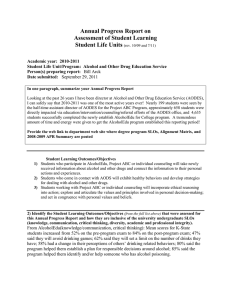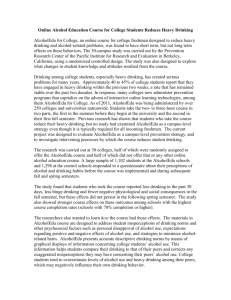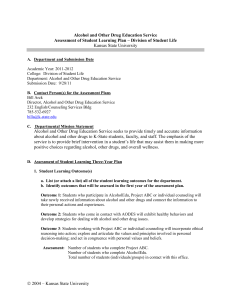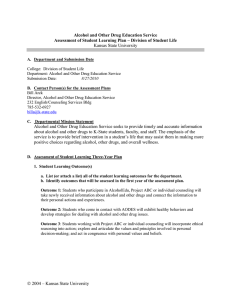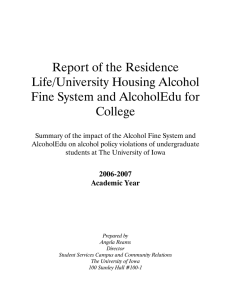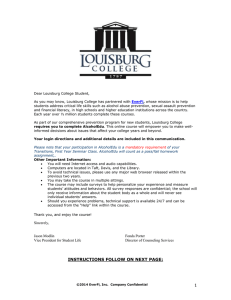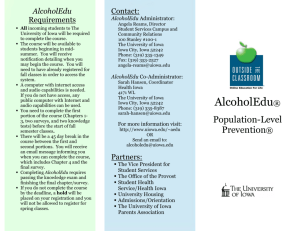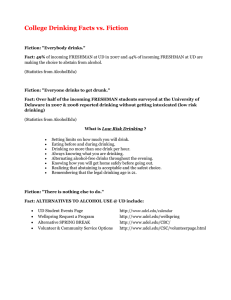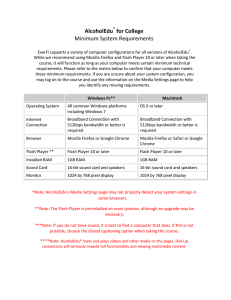AlcoholEdu Executive Summary 2006
advertisement
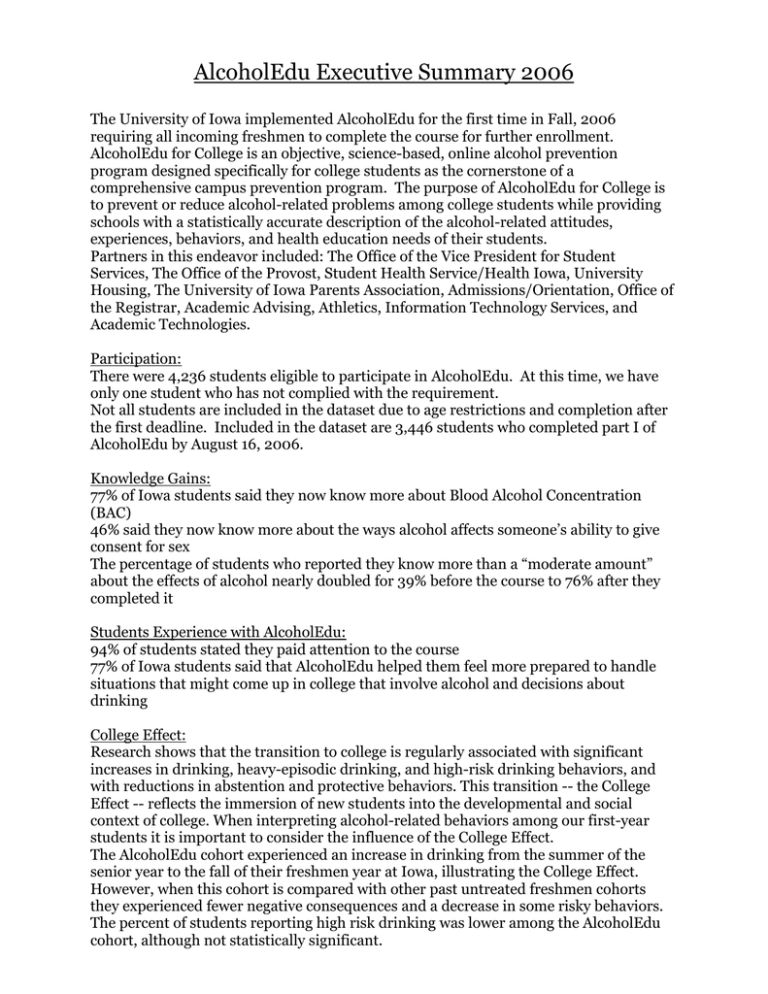
AlcoholEdu Executive Summary 2006 The University of Iowa implemented AlcoholEdu for the first time in Fall, 2006 requiring all incoming freshmen to complete the course for further enrollment. AlcoholEdu for College is an objective, science-based, online alcohol prevention program designed specifically for college students as the cornerstone of a comprehensive campus prevention program. The purpose of AlcoholEdu for College is to prevent or reduce alcohol-related problems among college students while providing schools with a statistically accurate description of the alcohol-related attitudes, experiences, behaviors, and health education needs of their students. Partners in this endeavor included: The Office of the Vice President for Student Services, The Office of the Provost, Student Health Service/Health Iowa, University Housing, The University of Iowa Parents Association, Admissions/Orientation, Office of the Registrar, Academic Advising, Athletics, Information Technology Services, and Academic Technologies. Participation: There were 4,236 students eligible to participate in AlcoholEdu. At this time, we have only one student who has not complied with the requirement. Not all students are included in the dataset due to age restrictions and completion after the first deadline. Included in the dataset are 3,446 students who completed part I of AlcoholEdu by August 16, 2006. Knowledge Gains: 77% of Iowa students said they now know more about Blood Alcohol Concentration (BAC) 46% said they now know more about the ways alcohol affects someone’s ability to give consent for sex The percentage of students who reported they know more than a “moderate amount” about the effects of alcohol nearly doubled for 39% before the course to 76% after they completed it Students Experience with AlcoholEdu: 94% of students stated they paid attention to the course 77% of Iowa students said that AlcoholEdu helped them feel more prepared to handle situations that might come up in college that involve alcohol and decisions about drinking College Effect: Research shows that the transition to college is regularly associated with significant increases in drinking, heavy-episodic drinking, and high-risk drinking behaviors, and with reductions in abstention and protective behaviors. This transition -- the College Effect -- reflects the immersion of new students into the developmental and social context of college. When interpreting alcohol-related behaviors among our first-year students it is important to consider the influence of the College Effect. The AlcoholEdu cohort experienced an increase in drinking from the summer of the senior year to the fall of their freshmen year at Iowa, illustrating the College Effect. However, when this cohort is compared with other past untreated freshmen cohorts they experienced fewer negative consequences and a decrease in some risky behaviors. The percent of students reporting high risk drinking was lower among the AlcoholEdu cohort, although not statistically significant. Evaluation Plan for AlcoholEdu – First Year students = objective/goal met = objective/goal not met = insufficient data Note: For a difference to be statistically significant at the .05 level, the two confidence intervals must not overlap. Process goals – Completion and Discussion • • • At least 85% of incoming students will complete the course within the required timeline. 96% completed within required timeframe. At least 85% of RAs will report having discussed AEdu with their floor members. 67% reported discussing; 8% did a formal program. At least 50% of College Transition instructors will report having discussed AEdu with their students. 67% reported discussing AEdu with their classes. Health objectives, based on Healthy Campus 2010 and AlcoholEdu content – Negative Consequences • • • • Reduce the proportion of students who report hangovers by 5% (2004 HIP data/2005 Harvard data, 65% of first year students report hangovers, 95% Confidence Interval: 55-69%) AEdu: 50% (95% CI: 48-52%) Reduce the proportion of students who report negative consequences as a result of their own or another person’s alcohol use by 5% (2004 HIP data, 64% of first year students reported at least one negative consequence as a result of drinking, 95% Confidence Interval: 57-70%) AEdu: 67% (95% CI: 66-69%) – not statistically significant; confidence intervals overlap Reduce the proportion of students who report blackouts by 5% (2004 HIP data, 47% of first year students reported blackouts, 95% Confidence Interval: 40-55%) AEdu: 37% (95% CI: 35-39%) Reduce the number of first year students transported to the ETC from the residence halls 29 students transported, Fall 2006; Housing is compiling data from previous years Behavioral objectives – Heavy drinking, risky behavior, and protective actions • • • • Reduce the proportion of students who report that they drove after drinking alcohol by 5% (2004 HIP data, 17% of first year students reported driving after drinking, 95% CI: 14-24%) AEdu: 12% (95% CI: 11-13%) Reduce the proportion of participants who report heavy drinking behaviors (chugging, pregaming) No baseline data, AEdu: 62% Increase the proportion of participants who report engaging in protective behaviors by 5% (2004 HIP data, 77% of first year students reported practicing at least one protective behavior, 95% CI: 70-82%) AEdu: 59% (95% CI: 57-61%) Reduce high-risk drinking among first-year students by 5% (2004 HIP data/2005 CAS data, 69% of first year students reported high-risk drinking, 95% CI: 62-75%) AEdu: 65% (95% CI: 63-67%) not statistically significant; confidence intervals overlap Learning objectives – BAC and sexual decision making • At least 50% of students who complete AEdu will report thinking more about blood alcohol concentration than they did before the program AEdu: 77% • At least 40% of those who complete AEdu will report knowing more about alcohol and its effects on the ability to give consent for sex AEdu: 46% Prepared by Office of Student Services Campus and Community Relations AlcoholEdu Administrators: Angela Reams and Sarah Hansen April 26, 2007
